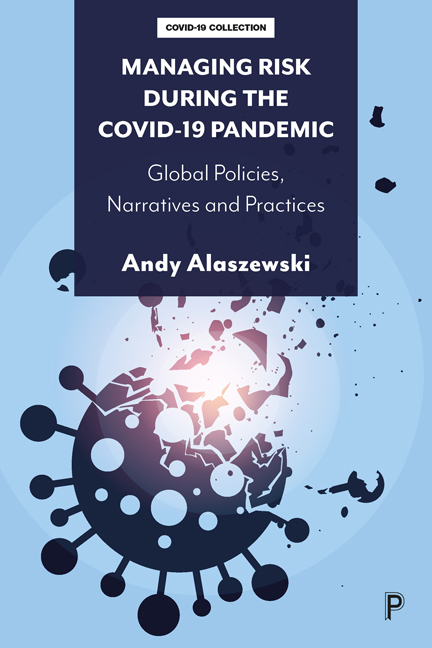Book contents
- Frontmatter
- Dedication
- Contents
- List of tables
- List of abbreviations
- About the author
- Acknowledgements
- Foreword
- Preface
- 1 Introduction: risk as a key feature of late modern societies
- PART I Responding to the challenges of the pandemic
- PART II Mitigating risk through science and technology
- PART III Risk narratives
- References
- Index
9 - Hindsight: inquiries and the blame game
Published online by Cambridge University Press: 20 January 2024
- Frontmatter
- Dedication
- Contents
- List of tables
- List of abbreviations
- About the author
- Acknowledgements
- Foreword
- Preface
- 1 Introduction: risk as a key feature of late modern societies
- PART I Responding to the challenges of the pandemic
- PART II Mitigating risk through science and technology
- PART III Risk narratives
- References
- Index
Summary
Risk as a way of allocating blame for misfortune
Analysing risk is generally seen as a way of predicting and managing the future, but it can also be used to explain what went wrong in the past (Bernstein, 1996, p. 48; Douglas 1990, p. 5) and as a way of identifying failings and allocating blame. As Douglas (1992) observed, ‘under the banner of risk reduction, a new blaming system has replaced the former system based on religion and sin’ (p. 16). In the case of collective disasters, there is pressure to identify why risks were not foreseen and mitigated.
Inquiries, risk and blame
With the development of improved science and technology, governments can reassure their citizens that ‘[m] ost accidents are preventable’ (Department of Health, 1993, p. 9). If this is the case, then disasters such as COVID-19 ‘are the outcome of poorly managed risks, rather than the inevitable misfortunes that we must all suffer from time to time’ (Green, 1999, p. 25). Given that COVID-19 has affected different countries in different ways and the ways it spread and affected human populations was shaped by human decisions, it can be seen as a man-made disaster, especially in those countries with high infection and death rates.
One mechanism for examining why those involved failed to identify the risks is through a public inquiry. Such inquiries involve:
• Admission of the failure of normal decision making: Some events are considered so shocking and such an existential threat, such as the terrorist attacks in the US on 11 September 2001, that there is immediate and unanimous agreement that they need to be investigated. The 9/11 attacks were followed almost immediately by a bipartisan inquiry of the Intelligence Committees of the Senate and House of Representatives, which published its report on 10 December 2002 (Joint Inquiry, 2002). However, governments are often reluctant to admit they have failed to protect citizens, so it may require considerable pressure to persuade them to appoint an inquiry. In the UK, when a dredger, the Bowbelle, hit and sunk a pleasure boat, the Marchioness, on 20 August 1989, killing 51 of the 130 on board the Marchioness, the survivors and relatives of the deceased were unhappy with the initially limited investigations.
- Type
- Chapter
- Information
- Managing Risk during the COVID-19 PandemicGlobal Policies, Narratives and Practices, pp. 135 - 150Publisher: Bristol University PressPrint publication year: 2023



